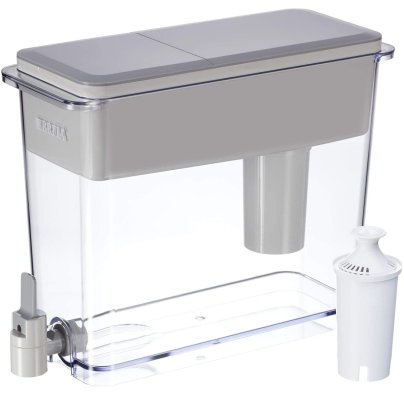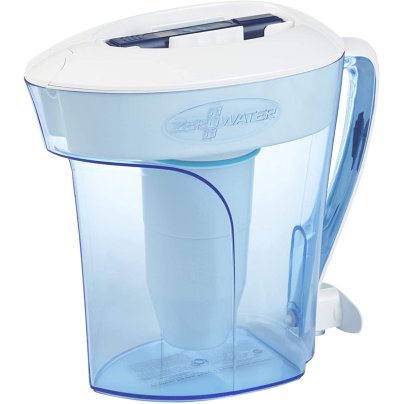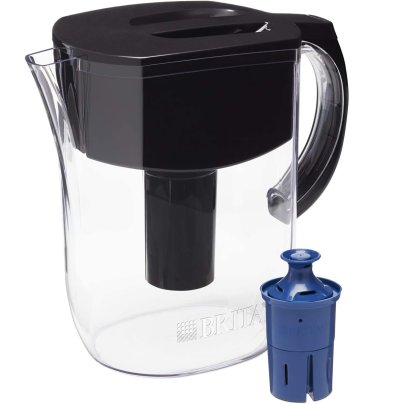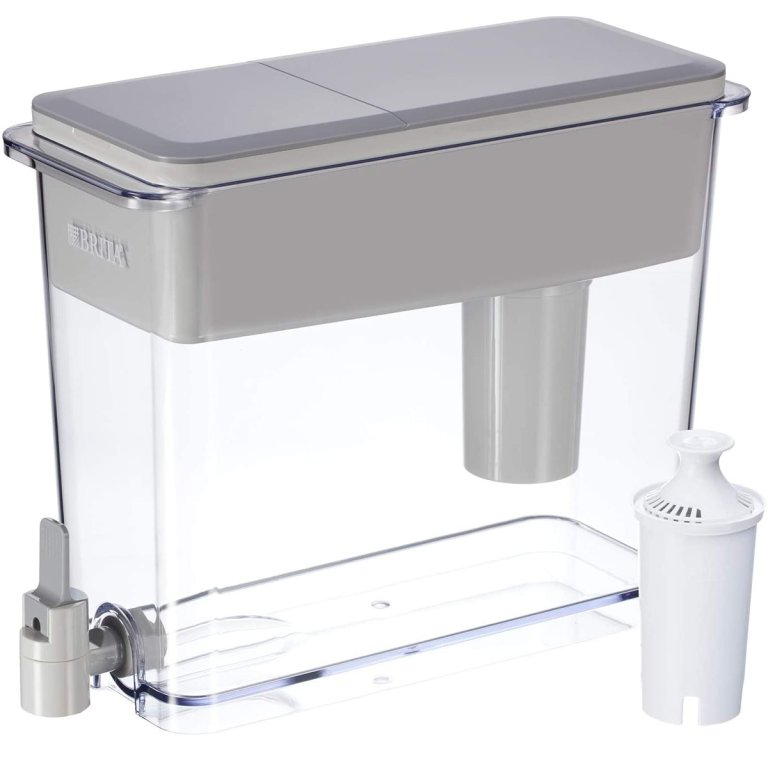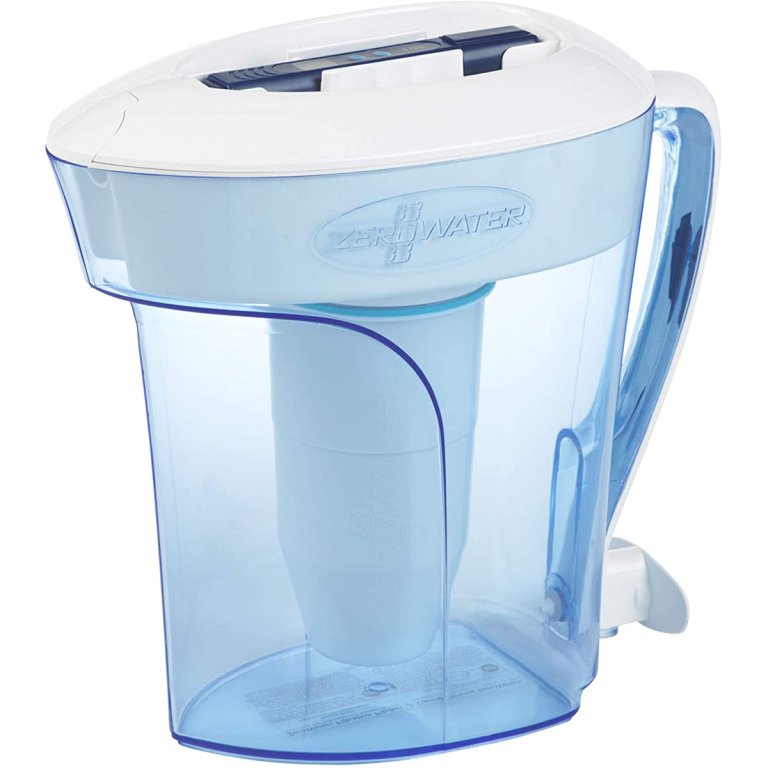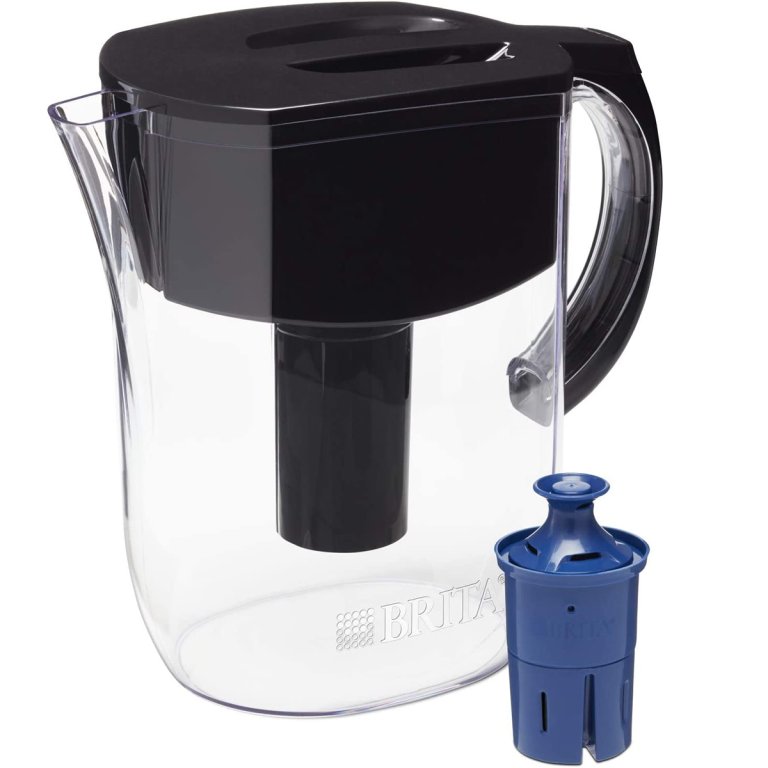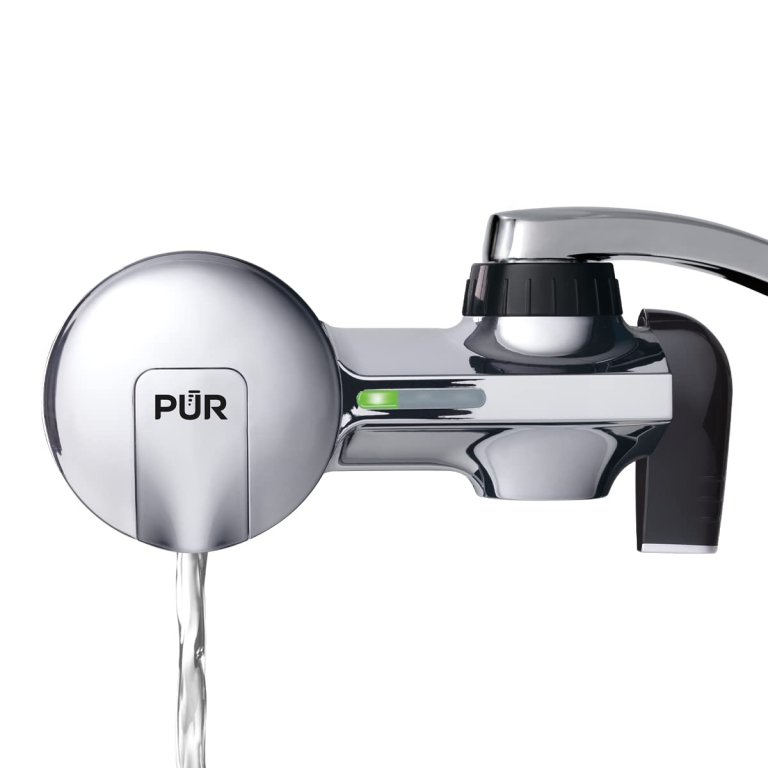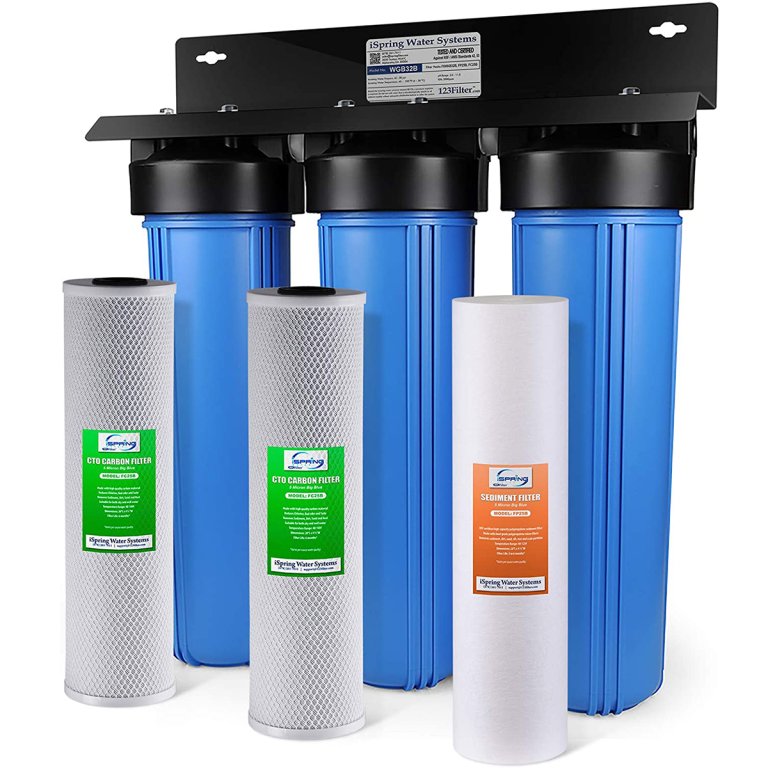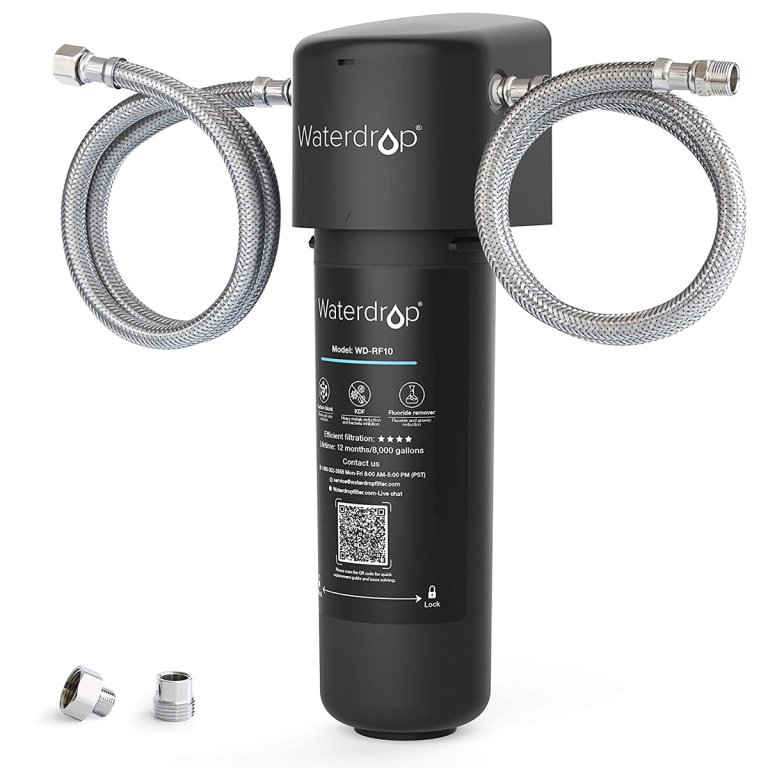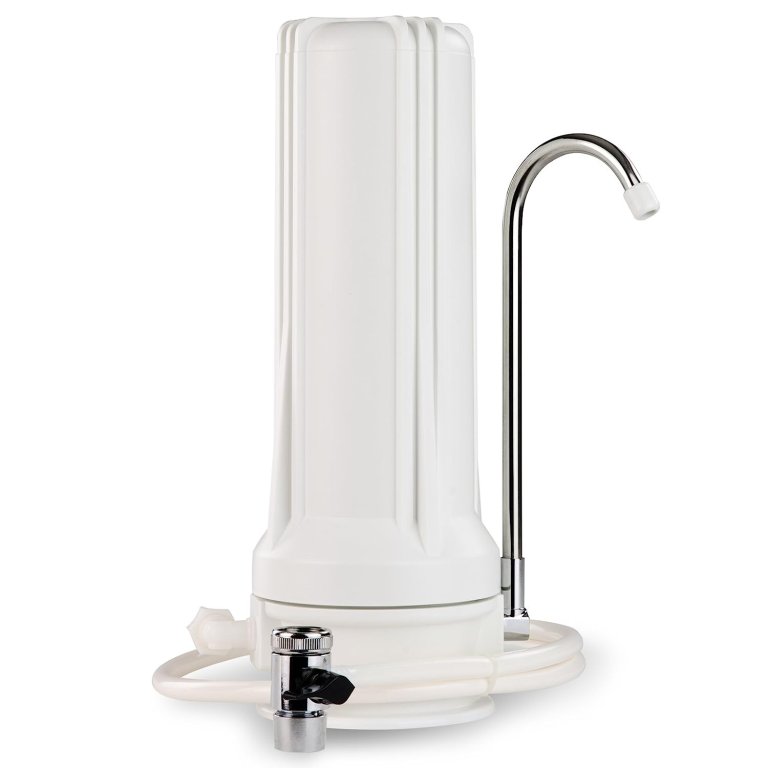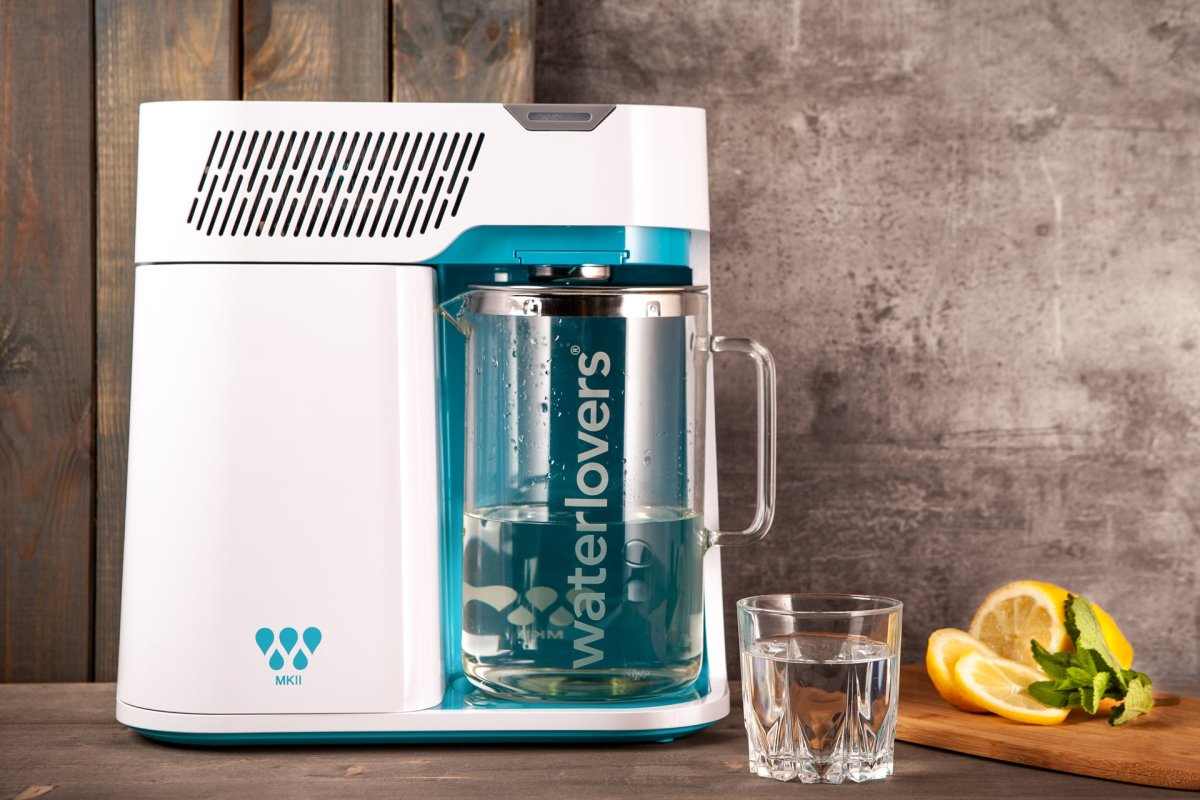
We may earn revenue from the products available on this page and participate in affiliate programs. Learn More ›
Although the city water in your home may be safe to drink, it could contain harmful chemicals that are unpleasant-tasting or even unhealthy. A good water filter helps solve those problems by removing heavy metals, pesticides, chlorine, sediment, and other things no one wants lurking in a glass of drinking water.
Today’s water filters come in various forms, including gravity filter pitchers, reverse osmosis systems, countertop filters, and under-sink filters. Some water purifier options even treat all the water in your home. Although they may take different forms, they all use a filtration method, such as a carbon filter, membrane, ion exchange technology, or ultraviolet light, to remove contaminants.
If the water in your home needs further purification, then read on to learn more about what goes into the best water filters, and learn why the models below are some of the best in their class.
- BEST OVERALL: Brita UltraMax 18-Cup Filtered Water Dispenser
- BEST BANG FOR THE BUCK: ZeroWater 10-Cup Water Filter Pitcher
- BEST PITCHER: Brita 10-Cup Longlast Everyday Water Filter Pitcher
- BEST FAUCET ATTACHMENT: Pur PFM400H Faucet Mount Water Filtration System
- BEST WHOLE HOUSE: iSpring WGB32B Whole House Water Filtration System
- BEST UNDER-SINK: Waterdrop 10UA Under Sink Water Filter System
- BEST COUNTERTOP: iSpring CKC1 Countertop Water Filter

How We Chose the Best Water Filters
To create our list of top-rated water filters, we looked at the wide range of options available on the market to provide a comprehensive list for shoppers to choose from. From simple pitchers that fit easily into the fridge to more permanent fixtures that install either on the counter, under the sink, or hook up to the water system for the entire house, our list of recommendations provides suitable options.
When gathering our top picks, we looked at a range of water filter reviews to ensure we were only including reputable brands that use top-quality materials. Most of our picks use long-lasting filters that—depending on household water consumption—will need to be replaced anywhere from every 3 months up to an entire year.
Our research also showed us that filtered water dispensers vary widely in terms of price. As such, we made sure to include both top-of-the-range filtration systems for shoppers looking for an upgrade and more budget-friendly options that provide clean filtered water without breaking the bank.
Our Top Picks
The top-rated water filters detailed here remove many kinds of contaminants from a home’s water supply and feature high capacities, limiting the cost of replacement. These filtration systems come from some of the best-known names in water purification.
Best Overall
Brita UltraMax 18-Cup Filtered Water Dispenser
Pros
- Very simple to use; fill with water and allow water to trickle through the filter
- Large 18-cup capacity; suitable for use as a whole-house water filter
- Compact size fits easily into a fridge or on a countertop
Cons
- Replacement Brita filters need to be bought every few months; can be pricey
Product Specs
- Type: Pitcher
- Capacity: 18 cups
- Installation: None
Simple, affordable, and its large drinking-water capacity make this time-honored water filter from one of the most well-regarded names in in-home water filtration systems hard to beat. The Brita UltraMax features a large water dispenser that holds 18 cups, or 144 ounces, of water, and its filter removes chlorine, mercury, copper, zinc, and cadmium. This water jug is compatible with Brita’s Longlast and Standard water filters, which have a lifespan of 120 gallons and 40 gallons, respectively. That translates to 6 months or 2 months, depending on usage.
At 10 inches tall and less than 5 inches wide, this Brita’s small size means it can fit on a countertop or in the fridge without taking up too much space. An easy-to-use water dispenser tap makes filling a drinking glass or coffee carafe easy.
Get the Brita UltraMax water filter at The Home Depot or Target.
Best Bang for the Buck
ZeroWater 10-Cup Water Filter Pitcher
Pros
- Includes a water-quality meter for peace of mind and user-friendliness
- Has a spigot and a regular pitcher pourer; prevents spills in busy households
- Fits easily into the fridge or on a counter
Cons
- Only comes with 1 filter; more will need to be purchased
- Replacement filters can be pricey
Product Specs
- Type: Pitcher
- Capacity: 10 cups
- Installation: None
ZeroWater’s 10-cup water filter pitcher is relatively affordable. This gravity filter features a five-stage system that uses both carbon and ion exchange technology to remove heavy metals, such as chromium and lead, pesticides, herbicides, and chlorine, as well as 99.6 percent of dissolved solids.
The ZeroWater filter pitcher’s water-quality meter, which attaches to the top of the pitcher for easy access, allows users to check the cleanliness of their water. This pitcher has a 10-cup capacity and includes a rubberized grip and one filter.
Get the ZeroWater water filter at Amazon or ZeroWater.
Best Pitcher
Brita 10-Cup Longlast Everyday Water Filter Pitcher
Pros
- Filter provides water purification for up to 6 months; perfect for families or large households
- Ideal for smaller fridges and families to use
- Easy to clean compared to other models available
Cons
- Filter can slow down over time; may need to be replaced prematurely
- May be too large to fit in some fridges
Product Specs
- Type: Pitcher
- Capacity: 10 cups
- Installation: None
Brita is one of the most well-known manufacturers of water filter pitchers. The company produces a variety of pitchers and filters with different NSF/ANSI certifications. The classic Everyday pitcher is made of BPA-free plastic and holds 10 cups of water. It features an easy-fill locking lid and an ergonomic handle that makes it comfortable to pour. The pitcher is also space efficient and will fit perfectly on a refrigerator shelf.
The Everyday pitcher includes Brita’s newer Longlast filter that has NSF/ANSI 42, 53, and 401 certifications. This filter reduces 99 percent of lead, chlorine, cadmium, mercury, benzene, asbestos, and more. Unlike Brita’s standard filter that lasts 2 months or per 40 gallons of water, the Longlast filter lasts for at least 6 months or per 120 gallons of water.
The Brita water filter pitcher itself has a basic sticker filter indicator so you can track the lifespan of your filter. However, even without the extra bells and whistles, it’s a solid product with a highly rated filter for an affordable price.
Get the Brita Longlast water filter at Amazon.
Best Faucet Attachment
Pur FM4000B Faucet Mount Water Filtration System
Pros
- Very simple installation; simply screw onto a current kitchen or bathroom faucet
- Fits most faucet varieties for user-friendliness and ease of use
- Easy on/off switch; can be used by adults as well as children
- Lasts up to 3 months before replacement
Cons
- Busier households may need more frequent replacements
Product Specs
- Type: Faucet attachment
- Capacity: 100 gallons
- Installation: Clicks easily onto the faucet
With an attractive stainless steel finish and comprehensive filtration system, this stainless steel faucet-mount water filtration system from Pur uses a mineral filtration system that employs natural minerals, activated carbon, and an ion exchange to filter out contaminants while adding a clean taste to the water.
This water filtration system filters out a variety of contaminants, including heavy metals such as lead and mercury, as well as pesticides and herbicides. The filter mounts to the faucet with no tools required. Each Mineral Core filter is designed to provide up to 100 gallons of filtered water, equal to about 3 months of use.
Get the Pur water filter at Amazon, The Home Depot or Target.
Best Whole House
iSpring WGB32B Whole House Water Filtration System
Pros
- Built-in sediment removal and carbon-block cartridges
- Filters out a wide range of contaminants, including chlorine, volatile organic compounds, iron, manganese, and harmful chemicals
- GAF and KDF filter cartridge increase the efficacy of this system
- Cartridges last for 6 to 12 months
Cons
- Not suitable for use in temperatures below 40 degrees Fahrenheit
- Installation is recommended for pros or experienced DIYers only
Product Specs
- Type: Whole-house
- Capacity: 100,000 gallons
- Installation: Experienced DIYers, or hire a professional
This whole-house water filtration system from iSpring features three filtration stages: One filter removes sediment, while two carbon filters eliminate odors and taste while filtering out pesticides, herbicides, and other chemicals. This model doesn’t remove dissolved solids, making it a suitable option for homes on city water.
This iSpring model can treat 100,000 gallons of water before the filters need replacement, which should be enough to handle the water quality needs of a family of four for up to a year. With a maximum flow rate of 15 gallons per minute, this water purifier can handle most homes’ needs. Installation is easy with iSpring’s instruction manual and online video instructions.
Get the iSpring WGB32B water filter at Amazon, Lowe’s, The Home Depot, Wayfair, or Overstock.
Best Under-sink
Waterdrop 10UA Under Sink Water Filter System
Pros
- Compact size fits under most sinks without taking up too much space
- Can be installed in just 3 minutes; suitable for DIYers as well as professionals
- Very easy to replace filter when it is no longer effective
- Relatively affordable compared to similar models available
Cons
- Filtration can slow over time; filter may need to be changed prematurely
Product Specs
- Type: Under-sink
- Capacity: 8,000 gallons
- Installation: Simple push-to-connect fittings
With a high capacity and an ability to remove different types of contaminants, the Waterdrop 10UA water filter system fits under the sink. It boasts an impressive 8,000-gallon capacity to cover a full year of water use by a family of four. It uses a five-stage filtration system that removes chlorine; heavy metals such as lead, mercury, arsenic, and fluoride; and a bevy of chemical contaminants, such as herbicides and pesticides. It also can filter out faucet-clogging sediment.
Push-connect fitting makes installation quick and easy. A fast flow rate produces 2 gallons per minute at 60 pounds per square inch, so you won’t notice a decrease in water pressure. At just 12 inches long and 3.6 inches in diameter, this filter fits under your sink without hogging space.
Get the Waterdrop water filter at Amazon or Waterdrop.
Best Countertop
iSpring CKC1 Countertop Water Filter
Pros
- Compact countertop unit will not take up a lot of space
- Easy to install; comes with 2 faucet adapters to accommodate most current setups
- Removes 95 percent of chlorine, sand, odors, silt, sediment, and rust
- Comes with multiple accessories for installation and maintenance
Cons
- Does not reduce the amount of total dissolved solids within tap water
Product Specs
- Type: Countertop
- Capacity: 6,000 gallons
- Installation: Simple
Those who prefer to have a separate faucet for drinking water can rely on the iSpring CKC1 countertop water filter. This useful little model is designed to connect to most water faucets in bathrooms, kitchens, laundry rooms, and more with ease and is compact enough to not take up a lot of space.
Made with a 10-inch 5-micron carbon-block cartridge, this filter removes 95 percent of chlorine, sand, odors, silt, sediment, and rust from water and meets National Sanitation Foundation/American National Standards Institute standards for peace of mind. Plus, this option comes with a plastic wrench, two faucet adapters, tubing, and an O-ring for leak-free use. Finally, the filters last for over 6 months of use.
Get the iSpring CKC1 water filter at Amazon or Lowe’s.
Jump to Our Top Picks
What to Consider When Choosing a Water Filter
Water filters come in a wide variety of shapes and sizes, which can make choosing one a confusing process. Understanding more about the different options available will help you decide which one is right for your home.
Type
- Water filter pitchers use a carbon filter to remove contaminants from water. They have a basin at the top of the pitcher to fill with tap water. Gravity makes the water run through the filter, filling the lower part of the pitcher with filtered water in about 10 minutes. The best water filter pitchers are not only the most affordable water filtration option, but they’re also easy to use.
- Faucet attachments affix to designated faucets and treat the water as it passes through it, purifying the water for drinking and cooking. These best faucet water filters are easy to install and are relatively inexpensive.
- Refrigerator water filters fit inside the refrigerator, filtering the water that goes into the water dispenser and ice maker. They use charcoal filters to purify the water and are easy to replace, though they can be costly and are designed to fit specific appliance brands.
- Under-sink filters, true to the name, install below the sink, treating the water before it reaches the faucet. These models may feature multiple filter stages, removing more contaminants than other types of filters. Under-sink water filters can be a little more complicated to install, and the replacement filters typically cost more.
- Countertop filters typically attach to existing faucets, which supply water to a small basin. The filter has a small faucet that draws from the basin for drinking water. These countertop water filter units are easy to install but take up countertop space and use visible hoses that attach to the kitchen faucet’s aerator.
- Portable water filters, often used by campers and backpackers, consist of a hand-operated pump that draws water into one end and pushes it through a series of carbon and microfiber filters before expelling purified water at the other end.
- Shower filters purify water for bathing, not drinking. They remove chlorine, bacteria, minerals, and other impurities that can lead to dry skin and damaged hair. These filters are compact and easy to install.
- Whole-house filters connect to the main water supply as it enters the home, filtering all the water a home uses—every faucet and appliance. Whole-house water filters are a cost-effective way of filtering all the water coming into a home.
Filtration
Water filters use a variety of methods to remove impurities from water.
- Carbon filtration, the most common type of water purifier uses carbon’s porous consistency to absorb water and remove contaminants. It’s especially effective at removing chlorine, pesticides, and solvents. However, it’s not particularly effective at removing heavy metals, such as nitrates, sodium, and fluorine.
- Reverse osmosis filtration uses a semipermeable membrane that allows water molecules to go through it while preventing impurities from passing through. Reverse osmosis systems use multiple filters, making them effective at removing chemical contaminants, such as copper and lead, and hard metals, such as calcium, arsenic, and mercury, but they will not remove certain herbicides and pesticides. Because they use multiple filters, reverse osmosis systems require strong water pressure to force the water through the system’s multiple filters and membranes.
- Ultraviolet filters pass water through a chamber flooded with UV rays. This effectively kills off bacteria, parasites, and viruses; however, it won’t remove mineral contaminants, such as lead, calcium, and arsenic, or pesticides and herbicides.
- Gravity water filters work by filtering water as it passes through a filter to drop from the upper basin of a pitcher to the lower basin. They include charcoal to filter out harmful chemicals and ion exchange resin that captures heavy metals. The best gravity filters remove contaminants such as lead, chlorine, pesticides, and even heavy metals.
- Mixed media filtration systems use multiple types of filtration in a single cylinder or container. Filters ranging from gravity pitchers to reverse osmosis systems feature multiple stages to remove different kinds of contaminants.
Power
Most filtration systems don’t require access to power. Gravity filters use gravity, requiring no additional power, while faucet, reverse osmosis, counter, and under-sink systems use the power of water pressure. Some of these filtered water dispensers need a minimum amount of water pressure to work correctly.
Water Quality and Contaminants
While your city water treatment plant removes many harmful chemicals that can make you sick, they can’t catch everything. Home filtration systems offer an additional layer of water purification by removing a wide range of contaminants, including pesticides, organic compounds, chemicals, pharmaceuticals, and harmful heavy metals, such as lead, mercury, and microorganisms. Keep in mind that not all water filters will remove every type of impurity. When shopping for a water filter, pay attention to the kinds of contaminants it can and cannot remove.
Filtration Rate
Water filters are rated as to the number of gallons of water per minute they can filter. When a gravity pitcher water filter purifies water, it can take a frustratingly long time to provide enough filtered water for even a single glass. While this slow process may be OK for a pitcher of drinking water, it won’t work for water filters designed for kitchen faucets or the entire home. Whole-home water filters, on the other hand, must be capable of filtering many gallons of water per minute since most showers and dishwashers can guzzle up to 5 gallons of water per minute.
Installation and Maintenance
Water filter installation and maintenance range in complexity. A faucet filter involves unscrewing the aerator and attaching a hose, while a reverse osmosis system may require a more involved process. Virtually all water filtration systems can be installed by a DIYer with only basic plumbing knowledge. Maintaining a water filter typically involves the periodic replacement of filters as they wear out, and most systems make changing out the filter a relatively simple task. Cost varies depending on the complexity of the system. Multistage reverse osmosis systems with seven filtration stages may produce some of the purest water you can drink, but the cost of replacing seven different filters can quickly add up.
FAQs
If you’re still wondering about what water filters can and cannot do, look below for the answers to some of the most commonly asked questions about these devices.
Q. Do water filters remove bacteria?
Only reverse osmosis water filters can remove bacteria. Chlorination and ultraviolet light disinfect water by killing bacteria.
Q. Do any water filters remove viruses?
Using a water filter is not an effective way to remove viruses; however, some water treatment systems can disinfect water by killing viruses. The good news is that through chlorination, most water treatment plants are very effective at killing off all bacteria and viruses in the water before it ever reaches your home. Your home system can then remove the chlorine from the system.
Q. Which filter removes the most contaminants?
A reverse osmosis system is the most effective type of filter for drinking water. Many of them feature seven or more filtration stages, along with the osmosis process, which makes them effective at removing 99 percent of contaminants from water, including chemicals, such as chlorine, heavy metals, pesticides, and herbicides. Some reverse osmosis systems even add healthy minerals and nutrients to the water.
